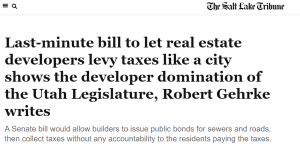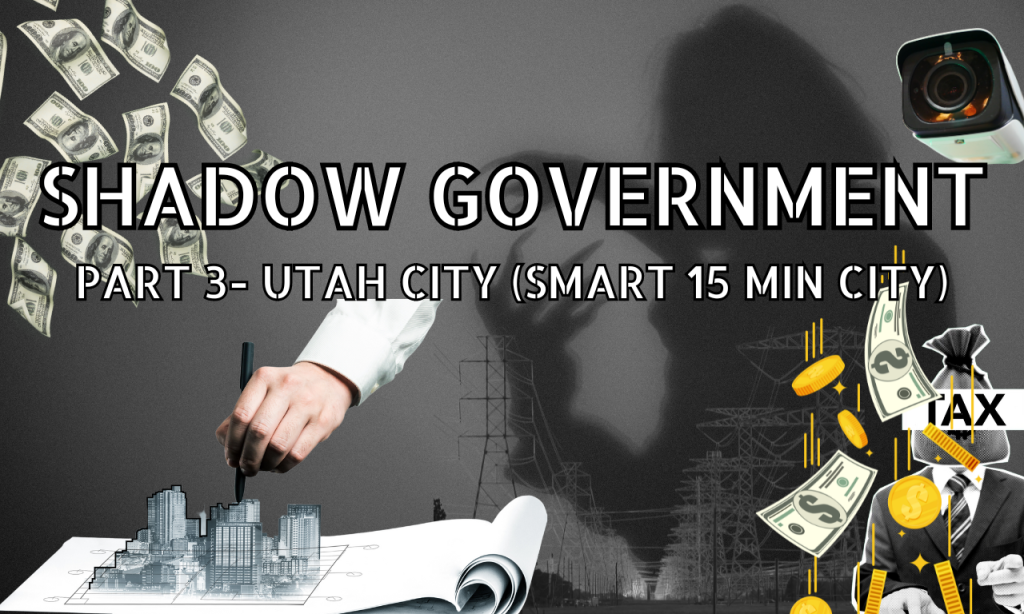By: Veronica Harper
America and Utah are coming to a point where our current economy and trajectory cannot support the whims of national organizations like the United Nations, the World Economic Forum, or more local ones like UDOT. It is not just a matter of whether we want what they are proposing or not, but rather do we have the funds to do so?
The People are saying we cannot afford all these increases in taxes, and in many cases our supposed “representative” government is looking back at us saying we do not care. Worse is that others are more important than your child, your family, your neighbors, even our community. In short, why do so many out of touch people get to force poverty upon most of us via tax increases for things we never wanted?
This brings us to Utah. Some legislators appear to be entertaining bills during the legislative session that are not beneficial to Utahns. One such example is SB295. Thankfully, this bill did not pass but the consequences of such a bill passing would have been less than desirable. Senator Dan McCay sponsored the bill. He said it was a “constant effort to try and find financing solutions” that would help with affordable housing. I wondered if it was another way to create an additional layer of government. My suspicions were confirmed when he said,
“So the idea is it has to act like a government, because that’s what it is. And that’s the reason why it’s able to obtain that financing at a lower cost.”
Source: https://www.deseret.com/utah/2023/2/27/23617153/housing-utah-legislature-developer-district
The headline below is from an article written by Robert Gehrke. SB295 was so bad that two normally opposing sides/views could agree on this bill.

Source: https://www.sltrib.com/opinion/2023/02/28/last-minute-bill-let-real-estate/
The link below will take you directly to the bill. You can read it for yourself. Pay attention to the wording. For example, look at line 238, very interesting choice of words. Remember, words matter. Let me know what you think in the comment section below. SB295 here.
I used SB295 as an example of the kinds of bills that could potentially pass if people were not involved in the process. Thankfully, there were enough people to challenge this bill, otherwise we may be dealing with unelected officials (developers et all) taxing us without any say from the people. This is why I continue to mention that the citizens of this great state need to reach out to their local elected officials as well as county and state officials. Not addressing these problems now could have far-reaching consequences for all of us. Water cooler talk says McCay is planning on bringing this baby back in 2024. Which brings me to the question, have you contacted your elected officials regarding the new proposed project called Utah City? If not, you should. You would not be alone as I keep hearing reports that people are extremely upset about this. I can’t say that I blame them.
In an article by the Daily Herald, Julie Fullmer has been quoted as saying she is,
“excited to see this development come to fruition. Other city leaders and councils began the discussions several years ago and have been working with the state, Utah Department of Transportation, Utah Transit Authority, Utah Lake Commission, The Church of Jesus Christ of Latter-day Saints, Alpine School District, Utah Valley University, the Huntsman Cancer Institute and other stakeholders.”
As I read the article, I did not see where the residents of Vineyard were involved in this planning process. How many townhall meetings were conducted prior to these public private partnerships deciding to move forward with their plans? Did residents have a say in whether they wanted something like this in their city? If they were, were they given truthful, direct information about the pros and cons? What about landowners whose land butts up against Utah Lake? Did they have a say in this project? Would taxes increase? As this would be a special district and a government entity (remember what Dan McCay said about special districts being a government entity), would taxes be imposed onto the residents of Vineyard during the duration of the project as well as after the project is completed? Would the tax be a permanent tax?
““According to Jeff Woodbury, managing partner of Utah City, the project is a “legacy development.”
“This is Utah County’s new downtown,” he said. “We have flown across the world to see what will be best for this community.”
“Woodbury said it is a “legacy” because it will always be upgrading with new technologies. Building something this big from the ground up, he added, is a gift that most cities wish they had.”
“My grandchildren will be working on this,” Woodbury added. “We feel a real stewardship to Utah County. We will hopefully see the need to make changes always.””
A legacy development sounds like a permanent tax scheme to me. What are your thoughts regarding this statement? Why would we need to bring global or international developers into a project that is supposed to be for the residents of Vineyard and why would they need to travel across the world to determine what is best for Vineyard’s residents? Wouldn’t the residents know what is best for them?
The two main developers are Flagship and Woodbury Corporation. Some of the project’s partners are SASAKI and Jeff Speck. Jeff is “internationally known as the foremost walkability expert in the world.” What are the implications for your personal vehicles? Does Utah City include plans for storage for your cars, trucks, or recreational vehicles or will this only be available for the billionaires? Why would I mention billionaires? Well, according to Nate Hutchinson of Flagship,
“There will be homes for billionaires and affordable housing for kids now living in their parents’ basements. It will be a mixed-use environment. All will be welcome, but it may not be for everyone.”
Interesting choice of words. It appears there will be a clear line drawn between the wealthy and the “kids now living in their parents’ basements.” Will the HOA costs be determined by what part of Utah City you live in? Did the residents of Vineyard get to voice their concerns over this?
Then there is SASAKI, whose most recent design project, Ellinikon Park, included “sparking a paradigm shift for future public parks across the world.” I would like to know what their intent was with the wording “paradigm shift”. This project is a “generational opportunity” for the people of Athens, Greece. Will they have a generational tax that is left to their children and grandchildren?
The website promoting the project has a 5:54 minute video that has a picturesque scene of futuristic buildings, greenery everywhere, parks, basketball courts and what looks to be private beach settings along the water’s edge. What struck me as peculiar is the amount of people. As the video continues you will notice the number of people and vehicles is limited. Why would the video show a picture-perfect setting with minimal people when evidence suggests they want to fit as many people as possible into high density units? The video reminds me of an unrealistic utopia that has the potential to turn into a utopian nightmare.
Utah City will be over 700 acres, which is 100 more than The Point. Will the homes that are for the billionaires be next to the homes for the kids who are currently living in their parents’ basements? I would argue they would not. This scenario suggests to me there would be some sort of barrier between where the “billionaires” live and the “affordable housing”. Does Utah City have the potential to be like this Chinese city?
Was their 15-minute city initially introduced as a convenient way to live, work, and play all within a 15-minute walking distance? Were they given a choice or did gates and facial recognition scanners get installed without warning. Watch the video and tell me if you see the possibility of this happening to both Utah City and The Point and all other walkable community’s government developers build. Remember what Dan McCay said above about these special districts being government entities.
As I investigated the Utah City website, I had to ask myself why I keep seeing the same types of words, including, sustainably, sustainable, walkability, 15-minute community, mass transit, etc. Words such as these can be found all over the United Nations and the World Economic Forum websites. The UN uses these very same words, and I would urge you to visit their website to see for yourself what they are doing. I can’t help but think there is a connection between the two.
There are other things that are concerning. For example, the LEED Platinum Certified program. What is LEED? It is Leadership in Energy and Environmental Design. Their mission and vision are,
“At USGBC, our vision is that buildings and communities will regenerate and sustain the health and vitality of all life within a generation. Our mission is to transform how buildings and communities are designed, built and operated, enabling an environmentally and socially responsible, healthy, and prosperous environment that improves the quality of life. We’re committed to transforming our built environment through LEED, the world’s most preeminent green building system.”
They also believe,
“Green building practices are more important than ever. Green buildings save money, improve efficiency, lower carbon emissions and create healthier places for people. They are critical to addressing climate change and meeting ESG goals, enhancing resilience, and supporting more equitable communities.”
Source: https://www.usgbc.org/guide-LEED-certification
Can you smell the United Nations agenda in this project? With every new development, Utah seems to be slipping further and further into a global, unelected, agenda by the United Nations. Think about how all this new technology will eventually control every aspect of our lives. These smart cities/15-minute cities are designed to utilize technology, including smart sensors, drones, and other means of surveillance to track and monitor behaviors and patterns. The applications that are implemented in our cities and towns, are designed to implement change and are successful “only if they are widely adopted and manage to change behavior.” These behaviors are things such as encouraging “people to use transit during off-hours, to change routes, to use less energy and water and to do so at different times of day.” – Mckinsey insights on Smart Cities.
Do not forget that these cities are being constructed by way of special districts, which are government entities that are not accountable to the people.
I would argue that eventually these measures could be used to forcefully control the population as well as use punitive measures if people fall outside the boundaries that have been set by the special district government. Are you willing to sacrifice your freedom for convenience? Are you willing to give up your constitutional rights for a shiny new open-air prison?
I would like you to ponder some quotes I have included regarding our freedom and liberty. Then ask yourself if Utah City, The Point, and other smart cities have the potential to take away your freedom?
“People never give up their liberties but under some delusion.” Edmund Burke
“No man is free who is not a master of himself.” Epictetus
“When the people fear the government there is tyranny, when the government fears the people there is liberty.” John Basil Barnhill.
“The urge to save humanity is almost always a false face for the urge to rule it.” H.L. Mencken.
Source: https://wisdomquotes.com/liberty-safety-benjamin-franklin/
SOURCES:
- https://www.deseret.com/utah/2023/2/27/23617153/housing-utah-legislature-developer-district
- https://utahcity.com/about/
- https://www.heraldextra.com/news/local/2023/aug/29/vineyards-new-650-acre-development-to-be-called-utah-city/
- https://www.usgbc.org/leed
- https://www.usgbc.org/guide-LEED-certification
- https://www.mckinsey.com/capabilities/operations/our-insights/smart-cities-digital-solutions-for-a-more-livable-future
- https://wisdomquotes.com/liberty-safety-benjamin-franklin/

